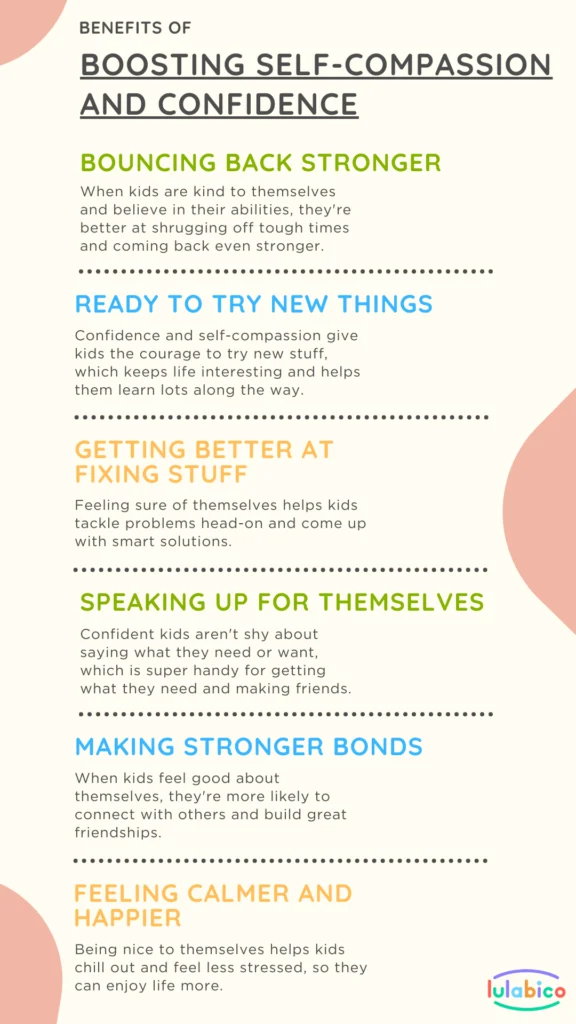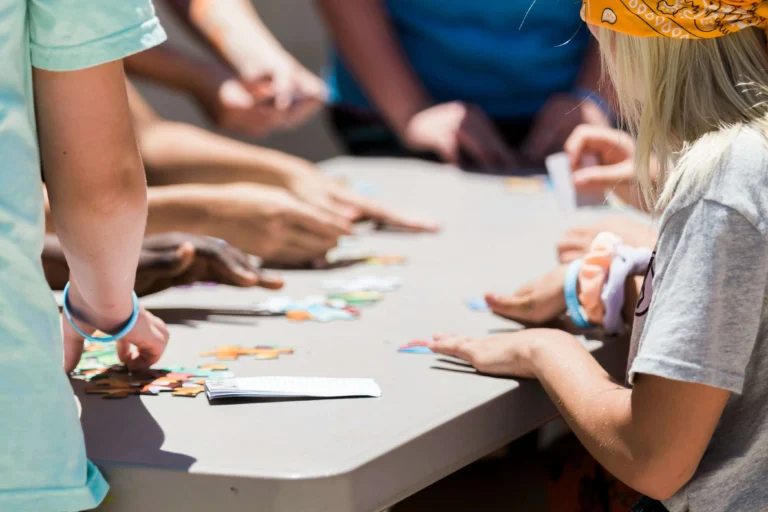At Lulabico, we understand the challenges and joys of raising children, which is why we’re excited to share this comprehensive guide to fostering self-compassion and confidence in kids. In this article, we’re diving deep into the world of self-compassion and confidence in children. It’s all about giving our little ones the tools they need to navigate life’s ups and downs with grace and resilience.
So, grab a cup of coffee (or tea, we won’t judge!) and let’s explore how we can empower our kids to shine bright and thrive in today’s world. Together, we’ll uncover practical strategies, share relatable stories, and sprinkle in a bit of expert advice to help you on your parenting journey.
Whether you’re a seasoned pro or a newbie to the parenting game, we’ve got you covered. Let’s dive in and discover the magic of raising confident, compassionate kids with Lulabico by your side. Boosting kids’ confidence starts here
Understanding Self-Compassion and Confidence
Self-compassion and confidence are big deals for kids’ happiness and growth. Self-compassion means being nice to yourself when things get tough, while confidence helps kids tackle new challenges with courage. Together, they build a strong foundation for kids to feel good about themselves and handle whatever life throws their way.
The Basic Elements of Self-Compassion:
To help kids develop self-compassion, focus on three things. By practicing these principles, children can learn to treat themselves with kindness, feel connected to others, and navigate challenges with resilience and confidence.
- Being kind to oneself: Help kids be gentle and understanding with themselves.
Imagine Sarah forgot to finish her homework and starts feeling really upset. Instead of being hard on herself, she reminds herself that everyone makes mistakes sometimes, and it’s okay. She gives herself a little pep talk, saying, “It’s okay, I’ll do better next time.
- Knowing we’re all in this together: Remind kids that everyone struggles sometimes.
Tommy sees his friend Emily struggling with a math problem in class. Instead of feeling embarrassed about not understanding it himself, he offers to help Emily out. He understands that learning new things can be tough for anyone, and it’s okay to ask for help or lend a hand.
- Paying attention to our thoughts and feelings: Encourage kids to be aware of their emotions without judging themselves
Before a big presentation at school, Alex feels nervous. Instead of ignoring his nerves or getting overwhelmed by them, he takes a moment to breathe deeply and acknowledge his feelings. He tells himself, “It’s normal to feel nervous, but I’ve practiced and I can do this.” By recognizing his emotions without judging himself, he feels more calm and confident.
Building Confidence Through Positive Actions
Child’s confidence is a journey of small yet significant steps. In this section, we’ll delve into actionable strategies to cultivate confidence in children. Let’s explore these practical approaches that empower children to face challenges with courage and celebrate their unique abilities.
Encouraging Healthy Habits
Start by promoting healthy habits in your child’s daily routine. Encourage nutritious eating, ensuring they get plenty of sleep, engage in regular exercise, and stay hydrated. Prioritizing their physical well-being lays a strong foundation for confidence and overall well-being.
Identifying and Celebrating Strengths
Take the time to identify and celebrate your child’s strengths and positive character traits. Whether they excel in academics, sports, arts, or show kindness and empathy towards others, acknowledging their achievements boosts their self-esteem.
Cultivating a Strong Character
Character-building is key to fostering confidence in children. Emphasize the values of kindness, honesty, respect, and empathy in their daily lives. Through interactive activities and storytelling, instill these values in your child, empowering them to make positive choices and believe in themselves.
Surrounding with Positive Influences
Encourage your child to spend time with positive influences and supportive peers. Create opportunities for them to engage in activities where they feel valued and accepted. Ensure they are surrounded by encouragement and positivity, enhancing their confidence and resilience.
Encouraging Acts of Kindness
Promote acts of kindness and altruism to nurture a sense of purpose and accomplishment in your child. Encourage them to help others, volunteer in the community, or simply offer a kind word. Inspire them to make a positive impact, fostering confidence in their ability to contribute to the world around them.
Fostering Positive Thoughts for Self-Esteem
Recognizing the power of positive self-talk and thought patterns in shaping children’s self-esteem is key to their emotional development. It’s like planting seeds of confidence and self-assurance that blossom into strong, resilient individuals. So, let’s dive into some practical ways we can help our kids grow into their best selves, inside and out.
- Recognizing and Challenging Negative Thoughts: For example, if your child says, “I’m not good at math,” encourage them to challenge this thought by saying, “I may find math challenging sometimes, but I’m capable of learning and improving with practice.”
- Cultivating Gratitude: Encourage your child to appreciate the small moments of joy and beauty in their daily lives. For instance, ask them to share one thing they are grateful for each night before bedtime, such as spending time with their pet or enjoying a delicious meal with family.
- Practicing Self-Compassion: When your child makes a mistake, remind them to be kind to themselves and offer self-compassion. For instance, if they forget their lines in a school play, reassure them by saying, “It’s okay to make mistakes. Everyone forgets sometimes. You did your best, and that’s what matters.”
- Embracing Imperfection: Celebrate your child’s efforts and progress, even if they don’t achieve perfection. For example, praise them for completing their artwork, regardless of whether it matches their initial vision. Encourage them by saying, “I love how you used different colors and shapes. Your creativity shines through!”
- Letting Go of Perfectionism: Help your child understand that nobody is perfect, including themselves. For instance, if they’re worried about getting a perfect score on a test, remind them that it’s okay to make mistakes. Encourage them by saying, “Do your best, and that’s all anyone can ask for. Mistakes are part of learning and growing.
Benefits of Cultivating Self-Compassion and Confidence:
Here’s why nurturing self-compassion and confidence in children is so important.

Recap
As we come to the end, let’s remember this: guiding our kids toward self-compassion and confidence is a journey filled with small victories and big leaps. By showing them kindness, celebrating their unique strengths, and teaching them to believe in themselves, we’re giving them the best tools for navigating life’s twists and turns.
At Lulabico, we’re here to walk alongside you on this journey. Together, let’s celebrate every milestone, overcome every obstacle, and empower our children to embrace their true potential. With love, support, and a sprinkle of confidence, we’re shaping a brighter, more resilient future for our kids—one step at a time.





